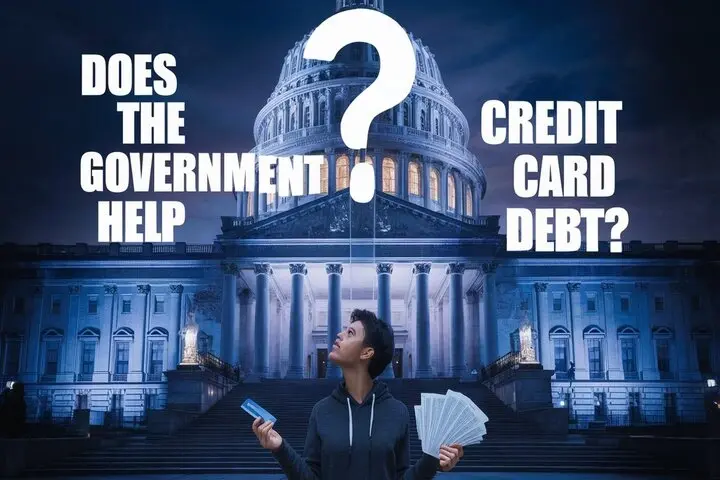
Payoffs on credit cards are increasingly becoming common in many families. The current statistics reveal that an average household in the United States has a credit card debt of over $8,000. This debt usually attracts interest rates that range from 15%-25% and once it gets this high, it can be hard to manage.
As credit card statements come in and they start accumulating, one begins to contemplate whether or not the government offers any assistance when it comes to credit card debt. Sadly, credit card companies and the government do not offer services to assist in paying off or consolidating credit card balances. Nevertheless, some governmental sources can point to ways of coping with debt and avoiding further financial issues.
Bankruptcy
The one that is a little more government-related is bankruptcy. Bankruptcy is a legal procedure that is authorized under federal law that helps in wiping out or reconstructing certain debts that are beyond your capacity to pay.
Two common types of consumer bankruptcy are:
Chapter 7 bankruptcy: This kind allows for the sale of assets to clear part of the outstanding balance and the balance is written off. Certain debts such as credit card debt and most of the unsecured debts are cleared through Chapter 7 bankruptcy. But you may be forced to surrender assets to lenders to pay back the amount through the profits arising from the transactions.
Chapter 13 bankruptcy: Here, you come up with a 3-5 year repayment schedule that has to be administered by the bankruptcy court to pay as much debts as possible. Some of the credit card debt can be wiped out, while the rest will be renegotiated to have a smaller monthly pay. This means even your home can be protected provided that you go on making payments for the debt.
Even though bankruptcy is similar to the concept of a ‘New Beginning”, it is not without its negative effects. It will remain on your credit history for several years, making it difficult to obtain loans, credit cards, rent homes, utilities, and sometimes getting a job. It also costs over $1,000 to file and administer a lawsuit of similar complexity in the state courts. For these reasons, bankruptcy is only considered when individuals are in a state that is financially confined to credit card debts. Nevertheless, it is one of the alternatives offered by the government if you find yourself in a situation where you cannot pay for the debt anymore.
Non-Profit Credit Counseling
The government is involved in supporting these agencies as they receive some of their funding from the government and they are located in different parts of the country. These services can be helpful if you feel you are facing high-interest credit card bills.
Exact services offered vary but often include:
- A big part of the concept is financial education seminars and materials.
- Tips and advice on how to properly budget and manage money
- Articles and tips on how to dig yourself out of the hole.
- With low interest rates or creditor’s fees being waived as agreed with the creditors
- Consolidation loans where several debts are paid off to be paid back in one installment
- Lower monthly installments and fair payment period
- Assistance in the formulation of the common payment plan also known as the debt management plan.
Another type of incentive plan is DMPs, which entail a deposit of a total amount or fixed monthly installments with the agency. They disburse the money to enable them to discharge their obligations in a given timeframe. It may not offer direct assistance in paying for outstanding balances, but the government’s support of credit counseling offers households professional help and courses on dealing with credit card debt and other unsecured liabilities.
Some of the agencies participating in NFCC, which is the largest national association of credit counseling agencies, provide DMPs to their clients. Be careful with the ‘charge repair’ companies offering high stakes to restore your credit score always check that non-profit organizations are accredited and recognized before signing up for the services.
Federal Student Loan Flexibility
Another form of help where the government comes in slightly better is on federal student loans. Even individuals with credit card balances which they pay on top of their active student loan payments can apply to reduce their federal student loan payment to $0 every month. The income-driven repayment plans have a structure that determines payments based on income, the number of people in the household, and other reasonable expenses that one incurs instead of the total amount owed.
The outstanding loan amount is then discharged after the borrower pays continuously for 20 to 25 years (or 10 years if the borrower is employed in a public service). This releases more funds every month towards paying off credit cards or other forms of high-interest debts. Note though that the forgiven loan amount at the end of such plans is considered as income for taxation. However, some level of income-contingent plans offers more leeway to tackle credit card balances for those also grappling with federal student loans.
In Summary
Regrettably, the government does not cover or discharge consumer credit card debt or offer special loan deals for it. In general, credit cards should be avoided in hard financial situations and when balances are difficult to repay because interest rates are high. But for the people in need of credit card debt, the government does subsidize honest credit counseling agencies that deal with the management of debts. Also, an adjustable and reasonably flexible repayment plan is made available to those who have federal student loans along with credit card balances. In certain circumstances where heaps of debts are unmanageable, bankruptcy wipes out debts or reorganizes them (but comes with the consequence of reduced credit scores for several years).
Thus, although it may not be the perfect we have our fingers crossed for, there are indeed some government-sponsored possibilities that can indirectly assist households in managing credit card balances. However, the idea is to get a hold of these services before debts become too out of control. In light of these concepts, perhaps proper management of credit card debt does not necessarily have to end up in extreme measures such as bankruptcy, provided that proper financial advice and budgeting techniques are employed.
Call now for expert credit repair services: (888) 803-7889
Read More:
How to stop paying with credit cards legally?
How can I wipe out my credit card debt?
How to pay off credit card debt when you have no money?
Can you walk away from credit card debt?




